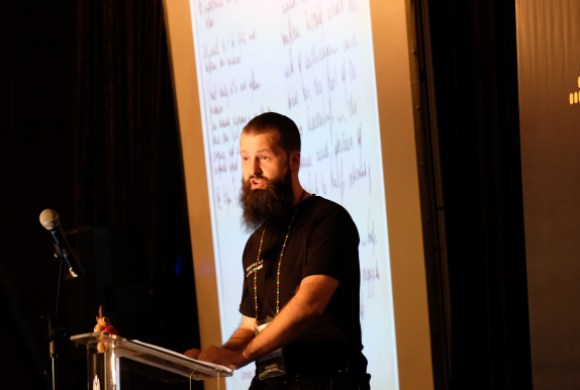
More than 700 attendees from nearly 80 countries gathered today for the start of Wikimania 2018—the annual conference celebrating Wikipedia and the Wikimedia projects, the Wikimedia free knowledge movement, and the community of volunteers who make them possible. This marks the 14th annual Wikimania, which takes place 18–22 July at the Southern Sun Cape Sun Hotel in Cape Town, where volunteers will come together to discuss and share ideas around the future of Wikipedia and free knowledge globally.
The event kicked off with an opening ceremony featuring a special presentation by a group of local Sinenjongo high school students welcoming conference attendees to Cape Town. It continued with remarks by Douglas Scott, President of Wikimedia ZA, the local South African Wikimedia affiliate and lead local organizer of this year’s conference who introduced this year’s conference theme: Bridging knowledge gaps, the ubuntu way forward, which aims to address gaps in knowledge, particularly those about African people, cultures, and languages, on Wikipedia and the Wikimedia projects. As part of this week’s centennial celebration to commemorate the birth of Nelson Mandela, Scott announced a partnership with the Nelson Mandela Foundation to make the inspirational writings of the former South African President’s 1962 diary available to the world on Wikimedia Commons and Wikisource.
Throughout this year’s Wikimania, attendees will explore sessions related to development of Wikimedia projects in Africa, global collaborations to support the advancement of free knowledge, opportunities to partner with galleries, libraries, archives, and museums (GLAMs). Wikimania 2018 is co-organized by the Wikimedia Foundation and Wikimedia ZA.
Wikimania 2018 will also bring together a diverse mix of attendees, including seasoned volunteer editors; researchers and data scientists; members from the medical community; librarians; and other free knowledge leaders. Confirmed keynote speakers include internet geographist Dr. Martin Dittus, who will be speaking on economic development, labour, power, participation, and representation, Joy Buolamwini, a noted artificial intelligence expert fighting to remove bias in machine learning, and Professor Sean Jacobs, an esteemed data scientist in digital culture and digital geography, alongside Wikimedia Foundation Executive Director, Katherine Maher, and Wikipedia founder, Jimmy Wales. All plenary sessions will be live streamed and available for public viewing online. More information and links to livestream session are available here.
“Wikipedia today is already fascinating and expansive. But it does not begin to represent the entirety of the world we live in — so much of the rich history, diversity of language, culture, and peoples of Africa is missing from the site,” said Katherine Maher, Executive Director of the Wikimedia Foundation. “We are honored to be hosted by Cape Town for this year’s Wikimania, the first ever in sub-saharan Africa, and look forward to speaking with our global communities, South Africans, and more about how we can begin to hear the critical perspectives that are missing from Wikipedia today.”
As part of the Wikimania press conference held on Friday, Katherine was joined by Banks Baker, Head of Global Product Partnerships – Search Content at Google, to announce the outcome of a recent collaboration between the Wikimedia Foundation and Google to expand and improve the representation of knowledge in Indic languages on Wikipedia, called Project Tiger. Through the project, both organizations, working in close collaboration with the Centre for Internet and Society (CIS), Wikimedia India chapter (WMIN) and local volunteers, hosted a pilot program to increase locally relevant content available in 12 Indic languages on Wikipedia.
Google provided Chromebooks and internet access to support volunteer editors with content creation as well as insights into popular search topics on Google that lack information in Indian languages online. Through a three month writing competition, volunteers created nearly 4,500 new Wikipedia articles across 12 languages, nearly double the initial benchmarks for the project. Based on this initial success of the pilot program, Google and the Wikimedia Foundation will hear feedback from volunteers about the program in a session on Sunday at Wikimania and further explore future implementation of these types of programs with other volunteer communities.
The annual Wikimania gathering will also provide an opportunity for volunteers to discuss Wikimedia’s future as part of Wikimedia 2030, a global consultation to define the future of the Wikimedia movement. Challenges with software localisation, the structure of data, and even newforms of knowledge that Wikimedia has defined as “verifiable” (text-based, rather than oral, for example) are some of the issues the movement is grappling with as it moves actively towards incorporating more diverse forms of knowledge within Wikipedia and the Wikimedia projects.
Wikimania also offers conference-goers time to experience the unique culture of Cape Town and join in the celebrations of Nelson Mandela’s 100th birthday. The conference’s theme, “Bridging knowledge gaps—the ubuntu way forward,” captures this spirit and finds its roots in the philosophy and way of life ubuntu.
“Ubuntu is summarised as the philosophy of ‘I am because you are,’ or alternatively ‘the belief in a universal bond of sharing that connects all humanity,'” explained Wikimedia South Africa President, Douglas Scott. “Volunteer community-driven projects like Wikipedia and what we are hoping to achieve at Wikimania in Cape Town capture this ethos well. Wikimedia South Africa is honored to have this opportunity to share this spirit with our friends and colleagues around the world.”
The Wikimedia Foundation is the nonprofit organization that supports Wikipedia, the Wikimedia free knowledge projects, and its mission of free knowledge for every single person.
To learn more about the conference, please visit: wikimania2018.wikimedia.org. You can follow the conference on #Wikimania as well as on Facebook and Twitter.

Can you help us translate this article?
In order for this article to reach as many people as possible we would like your help. Can you translate this article to get the message out?
Start translation